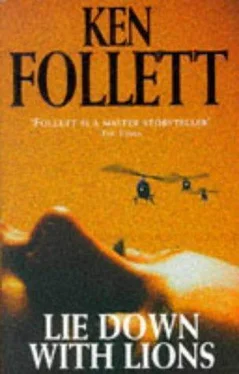Ken Follett - Lie down with lions
Здесь есть возможность читать онлайн «Ken Follett - Lie down with lions» весь текст электронной книги совершенно бесплатно (целиком полную версию без сокращений). В некоторых случаях можно слушать аудио, скачать через торрент в формате fb2 и присутствует краткое содержание. Жанр: Боевик, на английском языке. Описание произведения, (предисловие) а так же отзывы посетителей доступны на портале библиотеки ЛибКат.
- Название:Lie down with lions
- Автор:
- Жанр:
- Год:неизвестен
- ISBN:нет данных
- Рейтинг книги:4 / 5. Голосов: 1
-
Избранное:Добавить в избранное
- Отзывы:
-
Ваша оценка:
- 80
- 1
- 2
- 3
- 4
- 5
Lie down with lions: краткое содержание, описание и аннотация
Предлагаем к чтению аннотацию, описание, краткое содержание или предисловие (зависит от того, что написал сам автор книги «Lie down with lions»). Если вы не нашли необходимую информацию о книге — напишите в комментариях, мы постараемся отыскать её.
Lie down with lions — читать онлайн бесплатно полную книгу (весь текст) целиком
Ниже представлен текст книги, разбитый по страницам. Система сохранения места последней прочитанной страницы, позволяет с удобством читать онлайн бесплатно книгу «Lie down with lions», без необходимости каждый раз заново искать на чём Вы остановились. Поставьте закладку, и сможете в любой момент перейти на страницу, на которой закончили чтение.
Интервал:
Закладка:
So it was a setup. The White House wanted to achieve something dramatic in Afghanistan, so they asked the CIA to lend them an agent. The CIA wanted Ellis to work in the field again, so they told the White House to offer him this assignment, knowing or suspecting that the prospect of meeting up with Jane again was almost irresistible.
Ellis hated to be manipulated.
But he wanted to go to the Five Lions Valley.
There had been a long silence. Winderman said impatiently: "Will you do it?"
"I'll think about it," Ellis replied.
Ellis's father belched quietly, begged pardon and said: "That was good."
Ellis pushed away his dish of cherry pie and whipped cream. He was having to watch his weight for the first time in his life. "Real good, Mom, but I can't eat any more," he said apologetically.
"Nobody eats like they used to," she said. She stood up and began clearing away. "It's because they go everywhere in cars."
His father pushed back his chair. "I've got some figures to look over."
"You still don't have an accountant?" Ellis said.
"Nobody takes care of your money as well as you do," his father said. "You'll find that out if you ever make any." He left the room, heading for his den.
Ellis helped his mother clear away. The family had moved into this four-bedroom house in Teaneck, New Jersey, when Ellis was thirteen, but he could remember the move as if it were yesterday. It had been anticipated literally for years. His father had built the house, on his own at first, later using employees of his growing construction business, but always doing the work in slack
periods and leaving it when business was good. When they moved in, it was not really finished: the heating did not work, there were no cupboards in the kitchen and nothing had been painted. They got hot water the following day only because Mom threatened divorce otherwise. But it got finished eventually, and Ellis and his brothers and sisters all had room to grow up in it. It was bigger than Mom and Dad needed now, but he hoped they would keep it. It had a good feel about it.
When they had loaded the dishwasher he said: "Mom, do you remember that suitcase I left here when I came back from Asia?"
"Sure. It's in the closet in the small bedroom."
"Thanks. I want to look through it."
"Go on, then. I'll finish up here."
Ellis climbed the stairs and went to the little bedroom at the top of the house. It was rarely used, and around the single bed were crowded a couple of broken chairs, an old sofa and four or five cardboard boxes containing children's books and toys. Ellis opened the cupboard and took out a small black plastic suitcase. He laid it on the bed, turned the combination locks and lifted the lid. There was a musty smell: it had not been opened for a decade. Everything was there: the medals; both the bullets they had taken out of him; Army Field Manual FM 5-31, entitled Booby Traps; a picture of Ellis standing beside a helicopter, his first Huey, grinning, looking young and (oh, shit,) thin; a note from Frankie Amalfi which said To the bastard that stole my leg—a brave joke, for Ellis had gently untied Frankie's lace, then tugged at his boot and pulled away his foot and half his leg, severed at the knee by a wildly flexing rotor blade; Jimmy Jones's watch, stopped forever at half-past five—You keep it, son, Jimmy's father had said to Ellis through an alcoholk haze, 'cause you were his frien', and that's more than 1 ever wuz; and the diary.
He leafed through the pages. He only had to read a few words to recall a whole day, a week, a battle. The journal began cheerfully, with a sense of adventure, and very self-consciously; and it got progressively disenchanted, somber, bleak, despairing and eventually suicidal. The grim phrases brought vivid scenes to his mind: goddam Arvins wouldn't get out of the helicopter, if they're so keen to be rescued from Communism how come they don't fight? and then Capt. Johnson always was an A. hole I guess but what a way to die, grenaded by one of his own men, and later The women have rifles up their skirts and the kids have grenades in their shirts so what the fuck are we supposed to do, surrender? The last entry read What is wrong with this war is that we are on the wrong side. We are the bad guys. That is why kids dodge the draft; that is why the Vietnamese won't fight; that is why we kill women and children; that is why the generals lie to the politicians, and the politicians lie to the reporters, and the newspapers lie to the public. After that his thoughts had become too seditious to be committed to paper, his guilt too great to be expiated by mere words. It seemed to him that he would have to spend the rest of his life righting the wrongs he had done in that war. After all these years it still seemed that way. When he added up the murderers he had jailed since then, the kidnappers and the hijackers and the bombers he had arrested, they were as nothing when balanced against the tons of explosives he had dropped and the thousands of rounds of ammunition he had fired in Vietnam, Laos and Cambodia.
It was irrational, he knew. He had realized that when he came back from Paris and reflected for a while on how his job had ruined his life. He had decided to stop trying to redeem the sins of America. But this . . . this was different. Here was a chance to fight for the little guy, to fight against the lying generals and the power brokers and the blinkered journalists; a chance not just to fight, not just to pay a small contribution, but to make a real difference, to change the course of a war, to alter the fate of a country, and to strike a blow for freedom on a big scale.
And then there was Jane.
The mere possibility of seeing her again had rekindled his passion. Just a few days ago he had been able to think of her and the danger she was in, and then put the thought
out of his mind and turn the page of the magazine. Now he could hardly stop thinking about her. He wondered whether her hair was long or short, was she fatter or thinner, did she feel good about what she was doing with her life, did the Afghans like her, and—most of all—did she still love Jean-Pierre? Take my advice, Gill had said; check her out. Clever Gill.
Finally he thought about Petal. I tried, he said to himself; I really tried, and I don't think I handled it too badly—I think it was a doomed project. Gill and Bernard give her all she needs. There is no room for me in her life. She's happy without me.
He closed the diary and returned it to the case. Next he took out a small, cheap jeweler's box. Inside was a small pair of gold earrings, each with a pearl in the center. The woman they had been intended for, a slant-eyed girl with small breasts who had taught him that nothing is taboo, had died—killed by a drunken soldier in a Saigon bar— before he gave them to her. He had not loved her: he had just liked her and felt grateful to her. The earrings were to have been a farewell gift.
He took a plain card and a pen from his shirt pocket. He thought for a minute, then wrote:
To Petal—
Yes, you can have them pierced. With love from Daddy.
CHAPTER 6
THE FIVE LIONS RIVER was never warm, but it seemed a little less cold now, in the balmy evening air at the end of a dusty day, when the women came down to their own exclusive stretch of the bank to bathe. Jane gritted her teeth against the chill and waded into the water with the others, lifting her dress inch by inch as it got deeper, until it was up to her waist, then she began to wash: after long practice she had mastered the peculiar Afghan skill of getting clean all over without undressing.
When she had finished she came out of the river, shivering, and stood near Zahara, who was washing her hair in a pool with much splashing and spluttering, and at the same time carrying on a boisterous conversation. Zahara dipped her head in the water one more time, then reached for her towel. She scrabbled around in a hollow in the sandy earth, but the towel was not mere. "Where's my towel?" she yelled. "I put it in this hole. Who stole it?"
Читать дальшеИнтервал:
Закладка:
Похожие книги на «Lie down with lions»
Представляем Вашему вниманию похожие книги на «Lie down with lions» списком для выбора. Мы отобрали схожую по названию и смыслу литературу в надежде предоставить читателям больше вариантов отыскать новые, интересные, ещё непрочитанные произведения.
Обсуждение, отзывы о книге «Lie down with lions» и просто собственные мнения читателей. Оставьте ваши комментарии, напишите, что Вы думаете о произведении, его смысле или главных героях. Укажите что конкретно понравилось, а что нет, и почему Вы так считаете.












